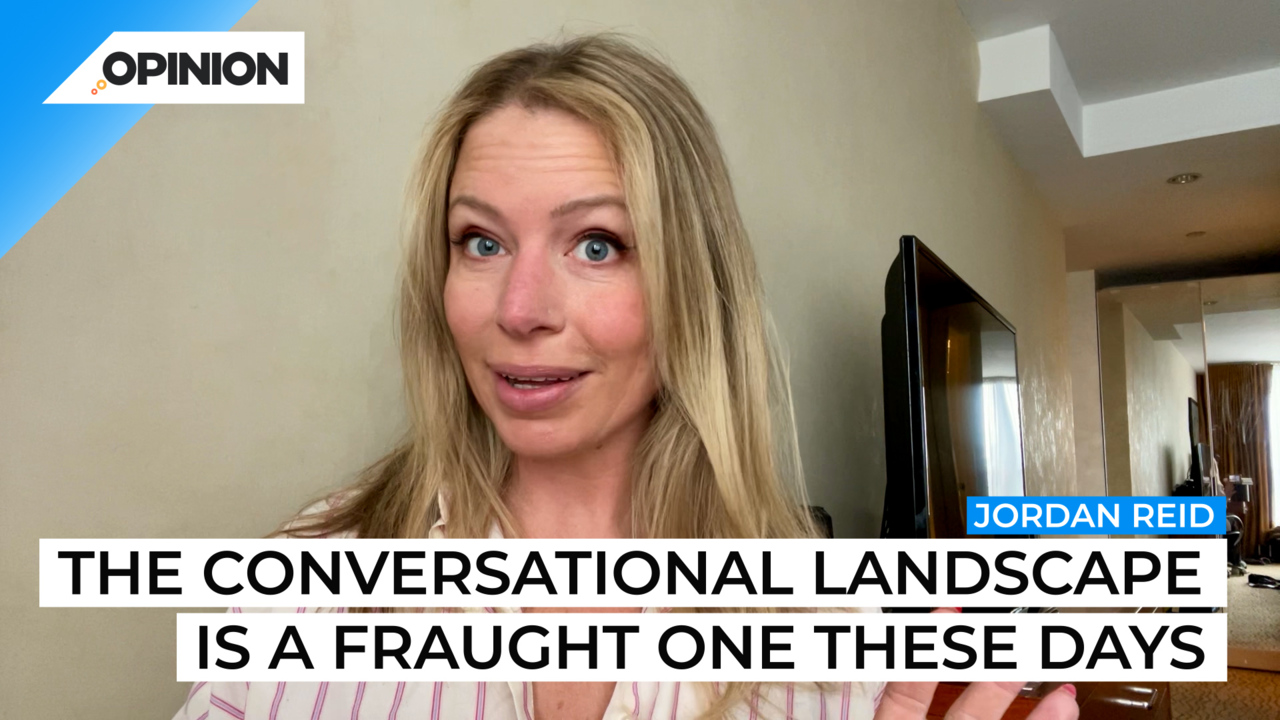
Commentary
-
Our commentary partners will help you reach your own conclusions on complex topics.
I read an article the other day in New York Magazine about the “New Rules” of etiquette – including making tipping your extravagance (yes, concur) and “no name-dropping celebrity nicknames” – he may be Bobby to you, but let’s call him Robert DeNiro in polite company.
One topic the article didn’t cover, to my consternation: How to gracefully navigate a world in which everyone has an opinion, and wants to tell you that yours Is wrong.
I know the pandemic’s effects are still making themselves known, and we’re all still in the process of remembering how to function in restaurants and on planes and such – but what I’m talking about is basic, straightforward human communication. Small talk, if you will.
The conversational landscape is a fraught one, these days. The etiquette surrounding not talking about things like politics – or money, or, trans athletes, or even who uses what bathroom when using which body part – has dissolved, and in many ways that’s a positive thing. We’re saying the quiet parts out loud. But this increased willingness to communicate one’s views seems to go hand-in-hand with a total belief in their absolute, factual accuracy. And the vastness of topics that politics have seeped into have left seemingly everyone with an opinion on seemingly everything.
The other day, I struck up a conversation in a nail salon with a woman who referred to the pandemic as a “plandemic.” It took me a minute to follow what she was getting at, but by then another woman a few seats down was already warning her (maybe us?) to watch what we say around here. To be clear, I had no horse in this race; I just wanted to get my nails done. I went with Ferrari Red, by the way.
Another example: At my child’s scout meeting, I got into a conversation about vaccines – just a bad idea across the board, but it wasn’t my choice – with a couple of parents who were medical professionals. But they were anti-vax. And – I think – anti-Ukraine. So pro Russia? And also very into wellness, and all of this was way too much for me to follow.
So what does a person who does not want to get into the minutiae of politics over a quick polish change do? I think Step 1 has to be: Assume you don’t really know what the person you’re talking to has been through. They could be coming off a nice long chat about Chinese spy balloons with their Aunt Gwendolyn, or have just read an article that’s gotten them – rightly or wrongly – fired up, they could be grieving a loss. Or they could be going through their own personal issues that you have no idea about.
Step 2? If you have the emotional bandwidth, I find that asking questions always works. If you want to engage and share your own opinions, sure, but from the standpoint that your conversational companion may not be up for a listen. And when all else fails? Just do what I did at the scout meeting: Say, “you know, that’s interesting, but I don’t really follow politics.” And then, if you’re me, cross your fingers and hope they don’t google you.
-
RFK Jr.’s war on psychiatric meds risks decades of progress
On Feb. 18, during his first meeting with staff, Health and Human Services Secretary Robert F. Kennedy Jr. stated that he intends to address the possible overmedication of children and the risks of antidepressants — echoing a Trump executive order aimed at reducing childhood chronic disease rates. The order has sparked concerns over youth access… -
Loss of USAID makes America and the world less safe
Elon Musk and President Trump shocked the U.S. foreign policy community and America’s partners around the world with the early and abrupt closure of USAID, the United States Agency for International Development. USAID was a cornerstone of U.S. foreign policy and consistently received bipartisan support from Congress. Experts warned that the decision puts millions of… -
Trump’s ‘Gulf of America’ renaming is mere political spectacle
Aboard Air Force One, en route to the Super Bowl in New Orleans, President Trump held a news conference. As the flight entered international waters over the Gulf of Mexico, he issued an executive order renaming it the “Gulf of America” and declaring Feb. 9 as “Gulf of America Day.” The order, titled Restoring Names… -
President Trump politicizes DC plane crash as Americans mourn
Sixty-seven people died when a Black Hawk helicopter crashed into American Airlines Flight 5342 as it came in for a landing at Reagan National Airport on the night of Jan. 29 outside of Washington, D.C. Investigators are still examining the accident and putting details together, but believe that the helicopter was flying at too high… -
Project 2025 is Trumpism on steroids
President Trump has already taken several actions that align with Project 2025, a far-right blueprint for Trump’s second term developed by the Heritage Foundation. Among other intiatives, his administration has moved to eliminate DEI programs, reinstate service members dismissed for refusing the COVID-19 vaccine, and revive “Schedule F,” a policy making it easier to fire…
Latest Opinions
-
 Getty Images
Getty Images
James Cameron seeks New Zealand citizenship following ‘horrific’ Trump re-election
-
 Getty Images
Getty Images
San Francisco DA Charges 11 in SNAP fraud scheme involving $4M
-
 Getty Images
Getty Images
California’s minimum wage increase led to job losses, higher prices: Study
-
 Getty Images
Getty Images
Appeals court blocks Arizona’s proof of citizenship law, cites voter suppression
-
 Getty Images
Getty Images
‘The free world needs a new leader’: Trump-Zelenskyy make jaws drop
Popular Opinions
-
In addition to the facts, we believe it’s vital to hear perspectives from all sides of the political spectrum.






